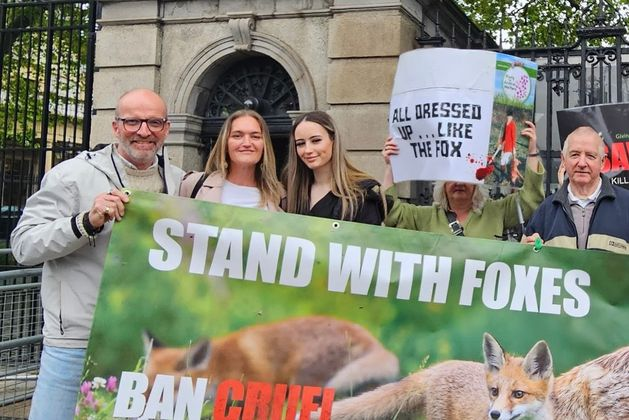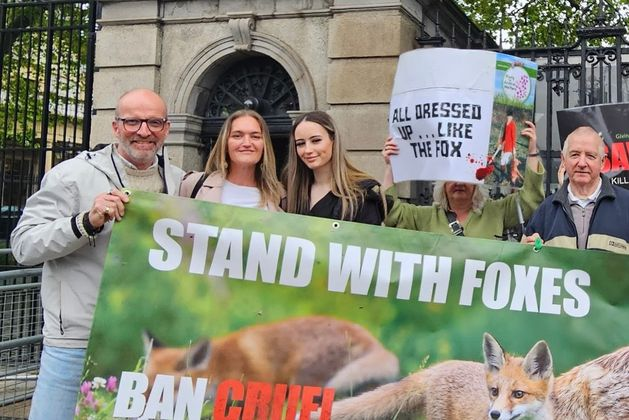Outrage as Councillor Demands End to Barbaric Fox Hunting!
The Controversy Surrounding Fox Hunting: A Call for Change in Ireland
Fox hunting has long been a contentious issue, particularly in Ireland, where its practice has been met with increasing opposition. Recently, Councillor Alan Lawes from Meath county Council publicly condemned fox hunting, labeling it a “cruel and barbaric practice” that is a relic of colonial times. This statement has resonated with many, igniting discussions about the ethics of hunting and the need for legislative change.
The Historical Context of Fox Hunting
Fox hunting traces its origins back to the 16th century in England and has since spread to various countries, including Ireland. Historically, it was seen as a sport among the aristocracy, characterized by a group of horse riders, hounds, and a hunted fox. However, as societal values have evolved, so too have perceptions of this practice. Many now view it as an outdated and inhumane activity.
The Cruelty Argument
Councillor Lawes highlights a significant concern: the inherent cruelty involved in fox hunting. Critics argue that the chase often results in severe suffering for the fox, which is pursued relentlessly by hounds until it is caught or killed. This aspect raises ethical questions about animal rights and welfare. As society becomes more aware of and sensitive to animal suffering, calls for a ban on fox hunting gain momentum.
- YOU MAY ALSO LIKE TO WATCH THIS TRENDING STORY ON YOUTUBE. Waverly Hills Hospital's Horror Story: The Most Haunted Room 502
Public Sentiment Against Fox Hunting
The sentiment against fox hunting is gaining traction in Ireland. Councillor Lawes’s statement reflects a growing consensus among the public that such practices should not continue. Numerous organizations advocate for the protection of wildlife and the banning of blood sports, which include not only fox hunting but also hare coursing and stag hunting. Activists argue that these activities have no place in modern society and that alternatives to hunting should be embraced.
Legislative Efforts and Challenges
Despite the increasing opposition, the journey toward banning fox hunting is fraught with challenges. Legislative efforts to prohibit the practice have faced resistance from traditionalists and hunting enthusiasts who argue that fox hunting is an integral part of rural culture and tradition. They claim it plays a role in wildlife management and conservation. However, opponents argue that there are more humane and effective methods for managing wildlife populations without resorting to hunting.
The Role of Education and Awareness
Education plays a crucial role in shaping public opinion about fox hunting. As more people become informed about the realities of fox hunting—its impact on animal welfare, the environment, and the ethical implications—support for a ban is likely to grow. Social media platforms, like Twitter, have become vital in spreading awareness and mobilizing support for anti-hunting campaigns. Posts like Councillor Lawes’s serve as catalysts for conversation and action, encouraging individuals to voice their opinions and advocate for change.
Alternatives to Fox Hunting
As society pushes for a ban on fox hunting, discussions about alternative wildlife management practices are essential. Non-lethal methods, such as habitat preservation, population control through natural predators, and community education about wildlife coexistence, can effectively address the concerns that proponents of fox hunting raise. These alternatives not only promote animal welfare but also foster a more compassionate relationship between humans and wildlife.
The Future of Fox Hunting in Ireland
The future of fox hunting in Ireland remains uncertain, but the tide appears to be shifting. With increasing public support for a ban and growing awareness of the ethical implications of hunting, it is possible that legislative changes could be implemented in the coming years. The voices of activists, politicians, and the public will be crucial in driving this change.
Conclusion
Fox hunting is a practice that has come under intense scrutiny as societal values around animal rights evolve. Councillor Alan Lawes’s call for a ban reflects a broader movement within Ireland to re-evaluate the ethics of hunting and the treatment of wildlife. As public sentiment shifts and awareness grows, the possibility of banning fox hunting becomes more realistic. Advocates for change must continue to educate the public, promote humane alternatives, and work towards legislative solutions that protect wildlife and ensure a more compassionate future for all creatures.
In summary, the fight against fox hunting in Ireland is not merely about banning a tradition; it is about embracing a new ethos that values compassion, respect for all living beings, and a commitment to ethical wildlife management. As more individuals join the conversation, the possibility of creating a more humane society becomes increasingly tangible.

“Fox hunting is a cruel and barbaric practice; it’s a left-over from colonial times and now most people don’t want to see fox hunting continue. We want it banned” Councillor Alan Lawes (Independent, Meath County Council) https://t.co/F8p2vOQZNv #Ireland #BanFoxHunting pic.twitter.com/TwkvnwxQkY
— Ban Blood Sports (@banbloodsports) May 31, 2025
Fox Hunting: A Cruel and Barbaric Practice
Fox hunting has long been a topic of heated debate, and for good reason. It’s often described as a cruel and barbaric practice that many argue should be banned. Councillor Alan Lawes, an independent member of the Meath County Council, has voiced a sentiment that resonates with many: “Fox hunting is a cruel and barbaric practice; it’s a left-over from colonial times and now most people don’t want to see fox hunting continue. We want it banned.” This statement encapsulates the growing frustration surrounding this outdated tradition, especially in modern society where compassion for animals is increasingly prioritized.
The Historical Context of Fox Hunting
To better understand why fox hunting is considered barbaric, it’s essential to look at its history. Originating in the 16th century, fox hunting became a popular pastime for the British aristocracy. It was seen as a sport that demonstrated wealth, power, and a connection to the land. However, these days, many view it as a relic from colonial times, a practice that has no place in our society, especially in light of contemporary views on animal rights.
In Ireland, the practice persists, despite mounting pressure to ban it. Many people, including Councillor Lawes, argue that it doesn’t reflect the values of modern society. The idea that hunting for sport is acceptable feels increasingly outdated and out of touch with the empathy that many individuals now feel toward animals.
The Impact on Wildlife
Fox hunting doesn’t just affect foxes; it has broader implications for wildlife and biodiversity. The methods employed during these hunts often lead to unnecessary suffering for the animals involved. Foxes are not just hunted for food; they are chased and often killed for sport. This raises ethical questions about our responsibilities toward other living beings. The cruelty involved in these hunts is hard to justify, especially when the primary motivation is entertainment.
Moreover, the disruption caused by hunting can have significant effects on local ecosystems. When fox populations are targeted, it can lead to an imbalance in nature. Predators play a crucial role in maintaining the health of wildlife populations. Removing them can lead to overpopulation of certain species, which can, in turn, result in other ecological problems.
Public Sentiment on Fox Hunting
Public opinion has shifted dramatically over the years. Many people today feel that fox hunting is no longer acceptable or necessary. According to surveys, a significant portion of the population supports banning fox hunting. This shift in sentiment is reflected in the activities of various animal rights organizations and advocacy groups, which have been tirelessly working to end this practice.
Councillor Lawes’ statement highlights this growing discontent. It’s not just a few activists who oppose fox hunting; many citizens are calling for an end to what they see as an archaic and cruel practice. Hashtags like “#BanFoxHunting” have emerged on social media platforms, creating a space for people to voice their opposition and rally support.
The Role of Legislation
Legislation plays a crucial role in addressing the issue of fox hunting. In some countries, laws have been implemented to restrict or ban hunting practices deemed inhumane. The recent push for stronger animal rights laws reflects the changing attitudes toward animal welfare. In Ireland, discussions around banning fox hunting have gained momentum, thanks to advocacy from various groups and concerned citizens.
Councillor Lawes and others in local government are actively pushing for reforms that will protect wildlife and align with the public’s growing desire for more humane treatment of animals. It’s important for citizens to engage with their local representatives and support legislation aimed at banning cruel practices like fox hunting.
Alternatives to Fox Hunting
With the growing consensus against fox hunting, it’s worth considering what alternatives exist. Many people enjoy outdoor activities that do not involve harming animals, such as hiking, birdwatching, and wildlife photography. These pursuits allow individuals to connect with nature while respecting the lives of its inhabitants.
There are also numerous organizations that promote wildlife conservation and ethical hunting practices. These groups focus on managing animal populations in ways that do not involve cruelty or suffering. For those who enjoy the thrill of hunting, ethical alternatives can provide the excitement without the moral dilemmas associated with traditional fox hunting.
Engaging in the Conversation
As the dialogue around fox hunting continues to evolve, it’s essential for individuals to engage in conversations about animal rights and welfare. Sharing articles, attending local meetings, and participating in social media campaigns can help raise awareness and promote change. By amplifying voices like Councillor Lawes’, we can contribute to a collective movement that seeks to ban practices deemed cruel and unnecessary.
The hashtags “#Ireland” and “#BanFoxHunting” have become rallying points for advocates across the country. Engaging with these communities not only spreads awareness but also fosters a sense of solidarity among those who share the same values. The more people who voice their opposition to fox hunting, the more pressure there is on lawmakers to take action.
Conclusion: A Call for Compassion
In a world where compassion for living beings is becoming increasingly valued, it’s time to reflect on practices like fox hunting that contradict these principles. The statements from leaders like Councillor Alan Lawes remind us that many people are ready for change. By advocating for a ban on fox hunting, we can take a significant step towards creating a more humane society that values the lives of all creatures.
As we continue to push for reforms and engage in discussions around animal rights, it’s important to remember that every voice counts. Whether it’s through social media, local advocacy, or simply having conversations with friends and family, we can all play a role in shaping a future where cruelty is no longer tolerated. Let’s strive for a world where compassion prevails over outdated traditions, and where animals are treated with the respect they deserve.

